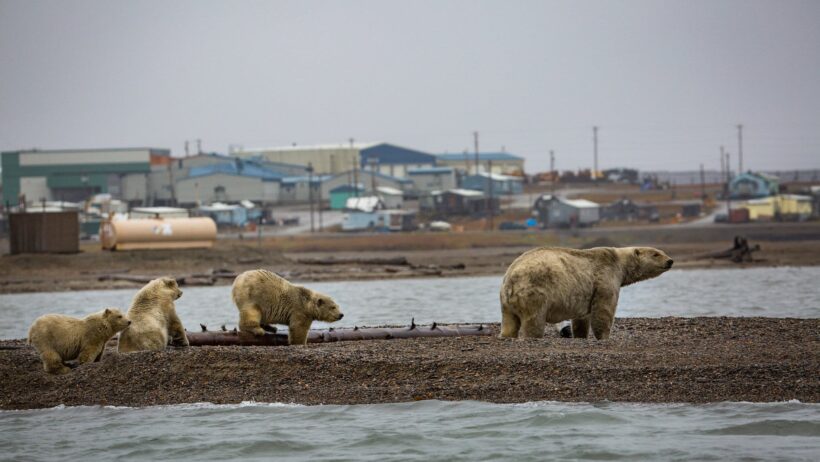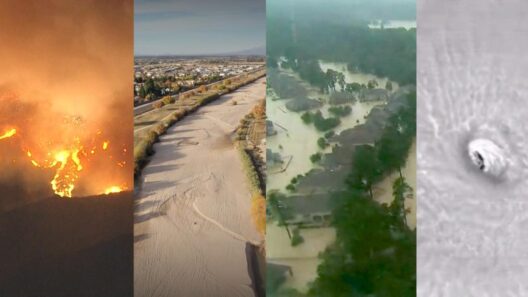Global warming, an omnipresent specter looming over contemporary society, fundamentally alters the fabric of our planet’s ecosystems. Many individuals regard polar bears as the quintessential symbol of climate change, capturing global attention through dramatic imagery of their diminishing habitats. Yet, the ramifications of global warming stretch far beyond this solitary species, casting a shadow over countless others and posing a myriad of existential threats to life on Earth.
One might ponder why polar bears have ascended to the status of iconic representatives of a broader environmental crisis. These majestic creatures, reliant on sea ice for hunting seals — their primary food source — serve as a poignant illustration of the immediate impacts of climate change. The alarming rate of ice melt in the Arctic region can be attributed to rising global temperatures, driven largely by human activities. However, their plight is merely a harbinger of the larger narrative, one that encompasses diverse communities of flora and fauna, along with the delicate balance of our ecosystems.
As the planet warms, habitats across the globe undergo radical transformation. For instance, forests, oceans, and wetlands are all experiencing shifts that threaten endemic species. In the Amazon rainforest, rising temperatures and altered precipitation patterns lead to droughts that culminate in catastrophic wildfires. Such fires decimate flora and confuse fauna, transforming lush ecosystems into arid wastelands. These changes do not merely affect individual organisms; they have cascading effects on local and global biodiversity.
Moreover, as terrestrial species struggle to adapt to these swiftly changing conditions, marine ecosystems face their own set of challenges. The warming waters of the oceans, principally as a consequence of excessive greenhouse gas emissions, contribute to phenomena such as coral bleaching. Coral reefs, which support approximately 25% of all marine life, are particularly susceptible to temperature fluctuations. When stressed, corals expel the symbiotic algae that provide them nutrients and vibrant color. This leads to bleached reefs with diminished biological diversity, disrupting the intricate food webs dependent on these vital ecosystems.
Beyond the confines of specific species and ecosystems, global warming triggers shifts in migration patterns, creating further complications. Birds, for example, have been observed to alter their migratory routes and timing in response to changing climates. The implications of these changes span geographical boundaries and can lead to mismatches in the availability of food sources as well as breeding conditions. Such phenomena can precipitate population declines, endangering multiple species while simultaneously destabilizing ecosystems that have evolved over millennia.
In addition to flora and fauna, human communities are intimately intertwined with the consequences of global warming. From coastal cities vulnerable to rising sea levels to agricultural regions facing droughts and unpredictable weather patterns, the socio-economic implications are profound. Food security, especially, is threatened as key crops fail in response to climate extremes. The reverberations of this crisis can lead to increased competition for resources, thereby exacerbating global inequality and igniting conflict.
With this widespread interconnectivity in mind, it remains critical to recognize that the crises imposed by global warming do not discriminate. Every ecosystem, every species, and by extension, every human being stands to lose. Species extinction is not merely a grim statistic; it signifies a loss of genetic diversity and resilience that could have far-reaching effects, including compromising our own health and wellbeing. For instance, the decline of pollinators, such as bees, due to habitat loss and changing climates threatens the viability of food crops essential for human survival.
Furthermore, the emotional response elicited by the plight of polar bears serves a more profound purpose. It embodies humanity’s connection to nature — a bond that, when severed, could evoke profound existential questions about our role in the intricate tapestry of life. Addressing climate change may rekindle an appreciation for the natural world, prompting collective changes in behavior and foster a deeper understanding of the interdependence between human society and the environment.
Education and awareness are paramount in galvanizing action against global warming. By recognizing the multifaceted nature of its impacts, individuals and communities can be spurred into action. Sustainable practices, from reducing carbon footprints to advocating for renewable energy solutions, can mitigate the crisis. This collective push for change is not merely altruistic; it is rooted in self-preservation, seeking to ensure that future generations inherit a planet rich in biodiversity and thriving ecosystems.
In conclusion, the narrative of global warming extends well beyond the struggles of polar bears. It encompasses an intricate web of life, interrelated ecosystems, and the communities that depend on them. The interplay between species extinction, habitat loss, and socio-economic ramifications underscores the urgency of addressing climate change with tenacity and resolve. Each of us bears a responsibility to foster a sustainable future, advocating for both the vulnerable species that cannot speak for themselves and the very fabric of life on Earth. Acting now is imperative in preventing an irrevocable decline that threatens both nature and humanity alike.







